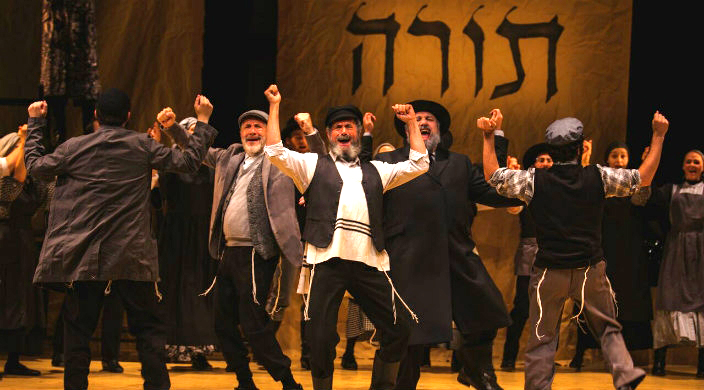
You don’t have to know mamalushen (the mother tongue) to enjoy the hit musical Fidler Afn Dakh in Yiddish. English subtitles are supplied, but getting the tam (flavor) of few key words and colorful expressions will enhance your theatrical experience – and enrich your Jewish vocabulary.
Our guide to Anatevke, a little shtetl (town) on the eve of the Russian revolution (erev der revolutsye), is Tevye der milkhiker (the milkman). He is an oreman (poor man), who complains to Got (God), also known as Reboyne-shel-oylem (Master of the Universe), about all the tsores (troubles) that befall him, like an injury to his ferdl (little horse) right before Shabbes (the Sabbath).
Like the other yidn fun shtetl (the Jews of the town), Tevye is all too aware that their lives are as precarious as a fidler afun dakh (a fiddler on the roof). The yidn hobn moyre (are afraid) of shreklekhe nayes (horrible news), of der Keyser (the Tsar), of a beyz oyg (an evil eye), of a shtrof fun Got (a punishment from God), all of which could lead to an umglik (a disaster).
And who besides Tevye, di tate (the father), lives in Anatevke?
Among them are zein vayb (his wife) Golde, di mame (the mother) of zeyer tekhter (their daughters, Tsaytl, Hodl, Khave, Sphrintze and Beylke). We also meet Yente di shadkhnte (the matchmaker), Leyzer-Wolf di katsef (the butcher), Motl di shnayder (the tailor), Pertshik di sotsialist (the socialist), der balibter rebe (the beloved rabbi), Nokhum di betler (the beggar), and der gradavoy (the constable).
According to traditsye (tradition), the tate must approve the shidukh (match) before a khosn (groom) and kale (bride) can join under the khupe (wedding canopy) for their khasena (wedding).
Freylekh zol zein (happy it should be) at the simkhe (celebration). After droshe-geshanke (wedding gifts) are presented to Motl and Tsaytl, the tansn (dancing) begins. But when Pestshik begins to tans with Hodl, the question arises: Is it an aveyre (a sin) for a mansparshoyn (a man) and an ishe (a women) to tans together? Having to judge af eyn fus (on one leg), so to speak, der rebe declares: An iser iz dos nit (It is not forbidden.) So much for traditsye!
Following their khasena, the khosn and kale are ready to make their hoyz (house) a heym (home), furnishing it with bebekhes (possessions) like an oyvn (oven), a top (a pot), a fan (a pan), a barsht (a broom), a bank (a bench), and a hook to hang a hitl (a hat).
Visitors say Gutn-tog (a good day), and when they leave, Got iz mit dir (God be with you) or Zay gezunt (be well). If a guest is shlekht (bad), he or she may be told, Gey aheym (Go home).
Here are some of my favorite Tevyeisms:
- Haynt bin ikh a ferd
Today I am a horse, as he has to pull his own milk cart.
- Vi nor es vert a bisl ruik dort oybn bay dir, un du host nit vos tsu ton – gistu zikh a nem tsu Tevyen
(To God:) Just as it gets a little quiet by you there on high, and you have nothing to do—you mess things up for Tevye.
- Vi zogt dort der heyliker medresh: “Az an oreman est a hindl, iz a simen, az eyner fun zey iz krank.”
As the holy Midrash says, “If a poor man eats a chicken, it’s a sign that one of them is sick.”
- Raboyne-shel-oylem…ikh veys, az mir zenen dokh epes ato-be-khar-`to-nu. Efsher vestu dir oysklaybn a mol emetsn andersh, neyn?
Master of the Universe, I know that we are the Chosen People. Maybe you could choose someone else, no?
- Hobn Odem un Khave den gehat a shadkhen? Avade gehat… Vayst oys, az di tsvey hobn gehat dem zelbn shadkhn.
About Hodl and Pershik: Did Adam and Eve have a matchmaker? Of course, they did. It looks like these two had the same matchmaker.
- In der toyre shteyt geshribn: “kol min liminoy” Peyresh Rashe: “a foygl kon zikh farlibn in afish, ober vu veln zey voynen tsuzamen?”
About Khave and Fyedke: In the Torah, it is written “each species to its own.” Rashi writes: “a bird can fall in love with a fish, but where will they live together?
- Kumt, kinder, lomir geyn.
Tevye’s last line: Come, children, let’s go.
Fidler Afn Dakh, a production of the National Yiddish Theatre Folksbiene directed by Joel Grey, opens for a limited engagement at Stage 42 in Manhattan on February 11.
Related Posts

Eight Unforgettable Jewish Oscar-Winning Movies

Eight Jewish Movies to Cuddle Up to in the Winter


